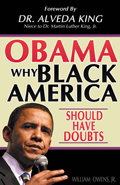By
William Owens, Jr.
January 17, 2015
NewsWithViews.com
Earlier this week, Coach Dave Daubenmire wrote a column suggesting that the leaders of America’s African American community do not believe that “Black Lives Matter.” To support this claim, he pointed to the high levels of black-on-black crime, abortion, and illiteracy within the black community. If black leaders cared, he wrote, they would be working on solving those problems. They would, like him, look at the Civil Rights Act of 1964 and consider the matter of racial tension solved, once and for all.
I appreciate Daubenmire’s efforts in addressing the conditions of some Black Americans and agree that abortion, crime and illiteracy are grave issues. I understand his effort in and I even agree with some of his arguments. Yet, I found his conclusion wanting. He essentially shifted blame from one group of Americans to another. He failed to offer solutions or show the way forward to reconciliation. His column left me without solid answers and with a deepening concern about the national discussion on race.
I have three main concerns.
First, I am saddened by Daubenmire’s faulty understanding of black leadership. How is it possible that Coach Dave could have interviewed every Black Leader in America and be qualified to pass such a scathing judgment on the entire Black Leadership community? Such a broad, overgeneralization only further divides Americans and creates animosities that compromise progress.
These statements are not only harmful, but they fail to consider the good that many black leaders have contributed to this nation, to their families, and to their communities. Al Sharpton is not a leader. He does not represent Black Americans. He is a puppet who distracts from the real leaders within the Black communities. There are countless leaders that should be celebrated more than him. These harshful and bitterly spoken judgments, in my humble opinion, merit an apology to those black leadership who do lead in this nation, in their families and in the communities.
Secondly, he seems to suggest that the Civil Rights Act of 1964 was a silver bullet solution to racial discrimination. Yes, the Civil Rights Act was a step in the right direction. But it is important to realize two things about this law. First, it affirmed rights given to us by God. It did not give Blacks certain rights. Second, it shows laws can be used for good, but remain limited in their effect. Yes, a law can outlaw discrimination on the streets and in a business sector where it can be identified and measured, but a law can't outlaw discrimination in the hearts and minds of people. Racism is an issue of the heart, which only God can regulate not the government. Daubenmire seems to rejoice too eagerly at this law. He fails to realize that repairing the damage caused by discrimination will take time and intentionality, not just a legal decree.
Third, Daubenmire fails to see the big picture. He rightly encourages a healthy self-respect and sense of responsibility. But he fails to take into account who is responsible for creating certain socioeconomic conditions that made self-actualization incredibly difficult for many Black Americans. Daubenmire is wrong to declare that, "black leadership has done it to you and that the white man has no part in this."
No one would argue against the idea that citizens are accountable for their individual actions. Yes, black Americans are responsible for their choices. But while Daubenmire points out the importance of personal choice-making, what he fails to acknowledge is the reality of oppressive laws that have shaped life for black Americans, laws that prevented many of them from taking responsibility of their lives as they would have had not those regulations been enforced.
K. Carl Smith, author of The Movement to Reignite America's Passion for Liberty, travels extensively, speaking to groups on how to bring a difference within the Black voting habits. I asked him how he would put into context the issues surrounding the The Civil Rights Acts. "It's a complex issue. To say that Blacks are accountable themselves is to ignore the facts that blacks did not write the Jim Crow laws,” he said. “It ignores the idea that the disenfranchisement that put them in an economic disadvantage. We have to take these acts into reality. We [blacks] did not do this to ourselves.”
Reconciliation is not just an issue of personal accountability. It also demands recognizing the consequences of decisions made by a law over which Black Americans had no control. For instance, Daubenmire points to the trillions of dollars spent on welfare. Do intelligent people really believe that black fathers simply do not love their own children? No! Today's outcome is the result of government programs that incentivized the abandon of families by husbands and fathers. Look at the FDR Deal. It provided money, housing and food for black families with one condition: the father could not live inside the home. In essence the government was saying, "We'll only give you food if we can be the father.”
Any solution to racial problems must balance the reality of personal responsibility with the grim reality of oppression. Solutions must acknowledge that conditions and institutions were, for many decades, shaped by a racist worldview. We must ask ourselves: how do we move on, together, from a painful past towards a reconciled future in which both personal responsibility and the formative power of laws are recognized and acknowledged?
Take what happened in Tulsa, Oklahoma in the early 1900’s. Greenwood, a neighborhood in Tulsa, Oklahoma was one of the most successful and wealthiest African American communities in the United States. It was popularly known as America's "Black Wall Street" until the Tulsa Race Riot of 1921. It started when locals accused 19 year-old Dick Rowland of assaulting a white elevator operator, 17 year-old Sarah Page. The Tulsa Tribune published the story and shortly after, a white lynch mob decided to take matters into their own hands and kill Rowland.
They gathered outside the jail and faced-off against a crowd of African American men who joined to protect Dick. There was an argument in which a white man tried to take a gun from a black man, and the gun fired a bullet up into the sky. This incident prompted many others to fire their guns, and the violence erupted on the evening of May 31, 1921. Whites flooded into the Greenwood district and destroyed the businesses and homes of African American residents, killing men, women, even children in their wake.
Over 600 successful businesses were lost. Among these were 21 churches, 21 restaurants, 30 grocery stores and two movie theaters, plus a hospital, a bank, a post office, libraries, schools, law offices, a half a dozen private airplanes and even a bus system. In all, 35 square blocks of homes and businesses were torched by mobs of angry whites. Property damage totaled $1.5 million. At the time of the riot, the American Red Cross estimated that over 300 people were killed. They listed 8,624 persons in need of assistance, in excess of 1,000 homes and businesses destroyed, and the delivery of several stillborn infants.
This still happens today, but in very covert ways of which is not always intended. Black Americans are denied a bank loan for a business, suffer half-hearted treatment at a restaurant. They suffer through cryptic “sensitive” conversations at dinner parties and watch lawmakers craft political agendas for the "right type of black.” We cannot ignore this. Moving forward requires rightly identifying the problems we are facing. Part of the problem is an over-reliance on government handouts. A second problem is that people with power wrote damaging laws. Both of these problems are compounded by the reality that our hearts have grown cold towards our neighbor, breeding atmospheres of animosity and distrust.
|
|
We all have fallen short of God’s glory. None of us are innocent. To totally excuse the white man in the past and present is unacceptable. Neither is it fruitful to accuse Black Americans of selling each other out. Forgiveness is all that God requires, not blame. I wholeheartedly believe that by God's grace we as individuals can be empowered to walk through the most difficult experiences of oppression. It is because of God's grace that many Black Americans have prospered and continue to do so today.
Yet the question remains: Once we lay blame where blame is due, whether that is on the individual or faulty laws and institutions, how do we change gears? How do we change tracks from being either white or being black? How can we experience the value of each other and celebrate the God in each of us? I'll tell you how. We first recognize that we are all of the same RED blood, we forgive and it is then that we can truly live.
� 2015 William Owens, Jr. - All Rights Reserved
William Owens is a prolific author, having written seven books in the Christian literature genre, including Divine Protocol, Obama: Why Black America Should Have Doubts, and Warriors Arise. He most recent work; Naked Before God - Words that Express My Heart is a compilation of his poetry that debuts Christmas 2014. Owens has spent two decades in the publishing industry and is also a noted activist within the Christian and Conservative communities. His current project is Race to Reconcile, a coast-to-coast bike trek in the Spring of 2015. The journey, which will include stops at orphanages, veterans’ homes, soup kitchens and prisons, is designed to inspire acts of forgiveness that will lead to reconciliation to God and one another regardless of color, religion, political affiliation and other differences. Owens’ new book, entitled Race to Reconcile: A Christian Approach to Strengthening Race Relations in America, will debut at the same time and will feature stories and experiences continuing the message of forgiveness and reconciliation. He is also launching a series of panel discussions throughout the nation called, “Celebration Forgiveness”.
E-Mail: william@racetoreconcile.com
Website: www.racetoreconcile.com













 Share
This Article
Share
This Article




